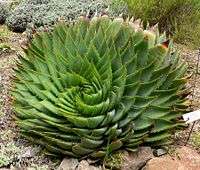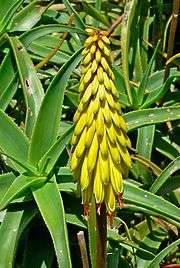Definify.com
Webster 1913 Edition
aloe
al′oe
(ăl′nō̍)
, Noun.
pl.
Aloes
(ăl′ōz)
. [L.
aloë
, Gr. ἀλόη
, aloe: cf. OF. aloe
, F. aloès
.] 1.
pl.
The wood of the agalloch.
[Obs.]
Wyclif.
2.
(Bot.)
[capitalized]
A genus of succulent plants, some classed as trees, others as shrubs, but the greater number having the habit and appearance of evergreen herbaceous plants; from some of which are prepared articles for medicine and the arts. They are natives of warm countries.
3.
pl.
(Med.)
The inspissated juice of several species of aloe, used as a purgative.
[Plural in form but syntactically singular.]
AS
American aloe
, Century aloe
the agave. See
Agave
.Webster 1828 Edition
Aloe
AL'OE
,Noun.
plu.
In botany, a genus of monogynian hexanders, of many species; all natives of warm climates, and most of them, of the southern part of Africa.
Among the Mohammedans, the aloe is a symbolic plant, especially in Egypt; and every one who returns from a pilgrimage to Mecca, hangs it over his street door, as a token that he has performed the journey.
In Africa, the leaves of the Guinea aloe are made into durable ropes. Of one species are made fishing lines, bow strings, stockings and hammocs. The leaves of another species hole rain water.
Definition 2026
Aloe
Aloe
Translingual

Aloe polyphylla
Alternative forms
Proper noun
Aloe f
- A taxonomic genus within the family Xanthorrhoeaceae – flowering succulent plants including Aloe vera.
Hyponyms
- (genus): Aloe perfoliata - type species; Aloe vera - selected species; for other species see
 Aloe on Wikispecies.Wikispecies
Aloe on Wikispecies.Wikispecies
Derived terms
aloe
aloe
English

Aloe striatula (2)
Noun
aloe (plural aloes)
- (in the plural) The resins of the trees Aquilaria agallocha and Aquilaria malaccensis, known for their fragrant aroma.
- A plant of the genus Aloe.
- A strong, bitter drink made from the juice of such plants, used as a purgative.
Usage notes
- Often used in plural (originally under influence of Old French).
Derived terms
Translations
plant of the genus Aloe
|
|
See also
Latin
Etymology
From Ancient Greek ἀλόη (alóē, “aloes”)
Pronunciation
- (Classical) IPA(key): /ˈa.lo.eː/, [ˈa.ɫɔ.eː]
Noun
aloē f (genitive aloēs); first declension
- The aloe.
- The bitter juice produced by the aloe used as a perfume, in medicine and in embalming.
- (figuratively) Bitterness (in general).
Inflection
First declension, Greek type.
| Case | Singular | Plural |
|---|---|---|
| nominative | aloē | aloae |
| genitive | aloēs | aloārum |
| dative | aloae | aloīs |
| accusative | aloēn | aloās |
| ablative | aloē | aloīs |
| vocative | aloē | aloae |
Descendants
References
- aloe in Charlton T. Lewis and Charles Short (1879) A Latin Dictionary, Oxford: Clarendon Press
- aloe in Charlton T. Lewis (1891) An Elementary Latin Dictionary, New York: Harper & Brothers
- ALOE in Charles du Fresne du Cange’s Glossarium Mediæ et Infimæ Latinitatis (augmented edition, 1883–1887)
Middle French
Etymology
Noun
aloe f (plural aloes)
- lark (bird)
References
- (fr) Godefroy, Frédéric, Dictionnaire de l'ancienne langue française et de tous ses dialectes du IXe au XVe siècle (1881) (aloe)
Old French
Noun
aloe f (oblique plural aloes, nominative singular aloe, nominative plural aloes)
- lark (bird)
References
- (fr) Godefroy, Frédéric, Dictionnaire de l'ancienne langue française et de tous ses dialectes du IXe au XVe siècle (1881) (aloe)
Romanian
Etymology
Borrowing from French aloès and Latin aloē.
Noun
aloe f (plural aloe)
- aloe
- a substance extracted from the aloe plant
Declension
declension of aloe
| singular | plural | |||
|---|---|---|---|---|
| indefinite articulation | definite articulation | indefinite articulation | definite articulation | |
| nominative/accusative | (o) aloe | aloea | (niște) aloe | aloele |
| genitive/dative | (unei) aloe | aloei | (unor) aloe | aloelor |
| vocative | aloe, aloeo | aloelor | ||